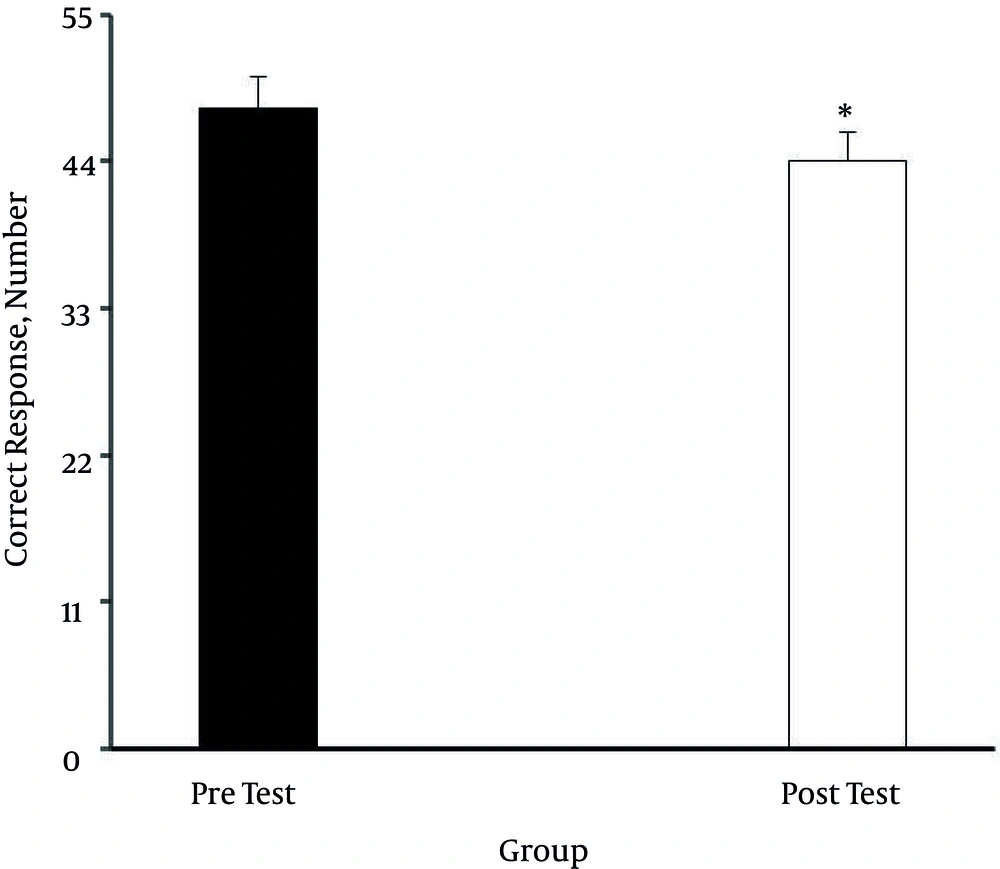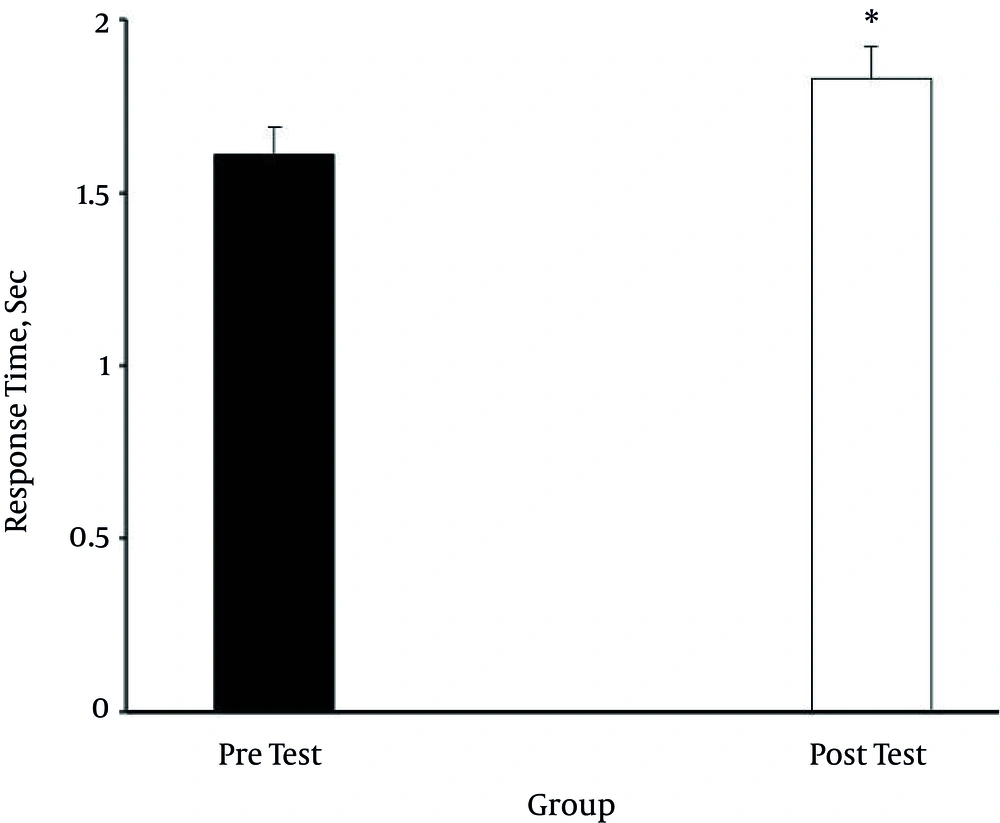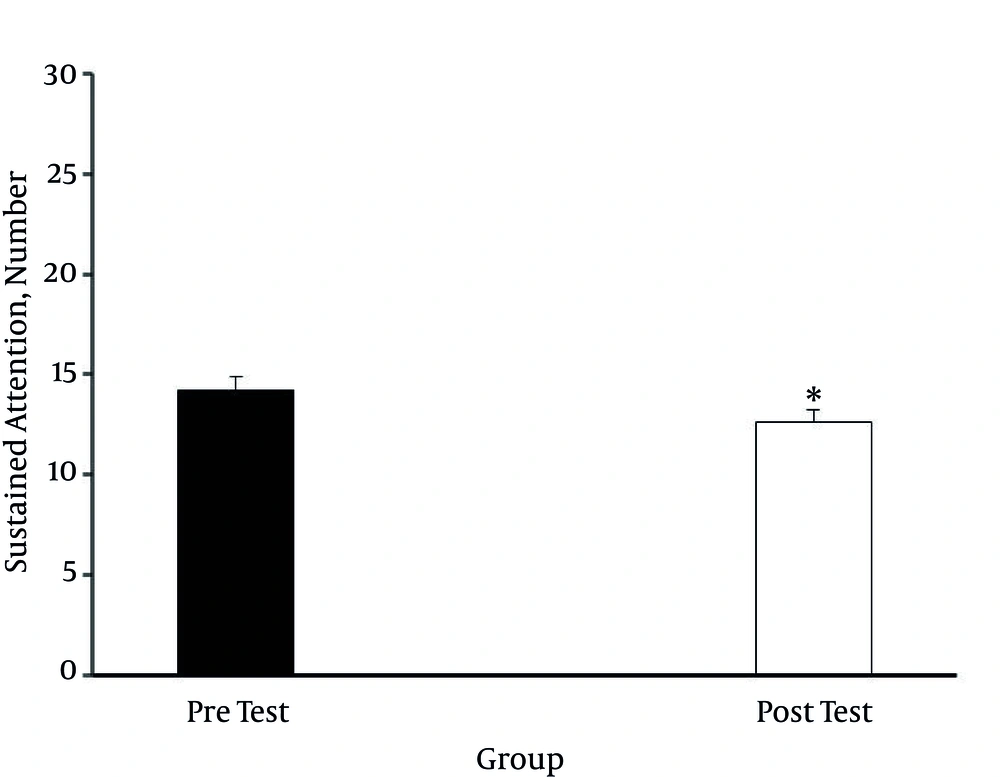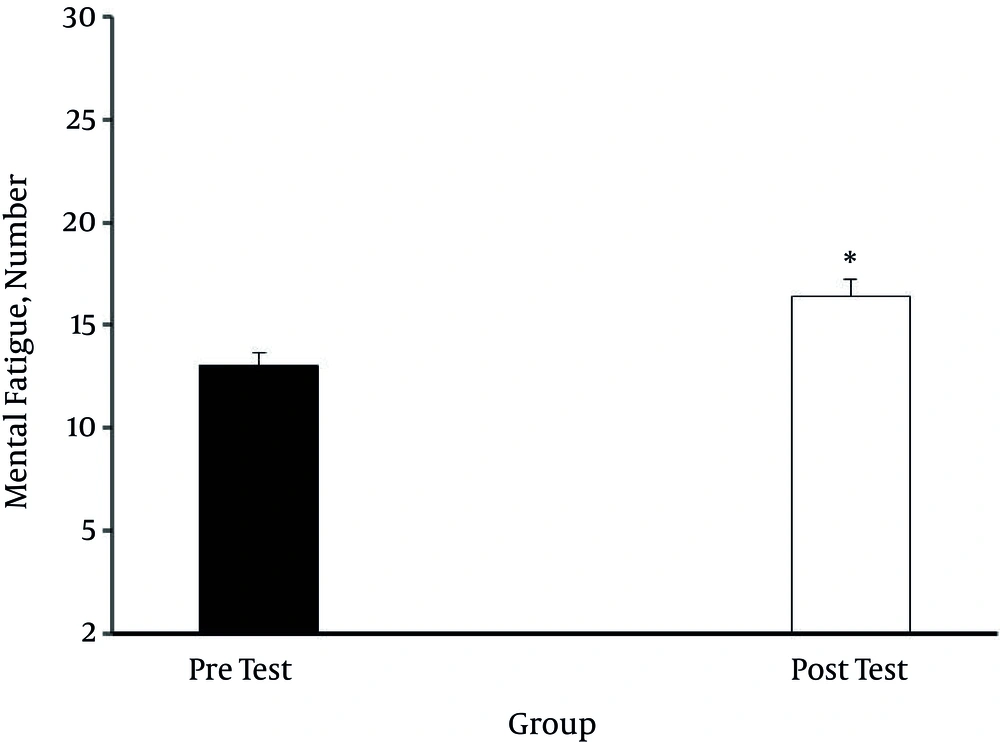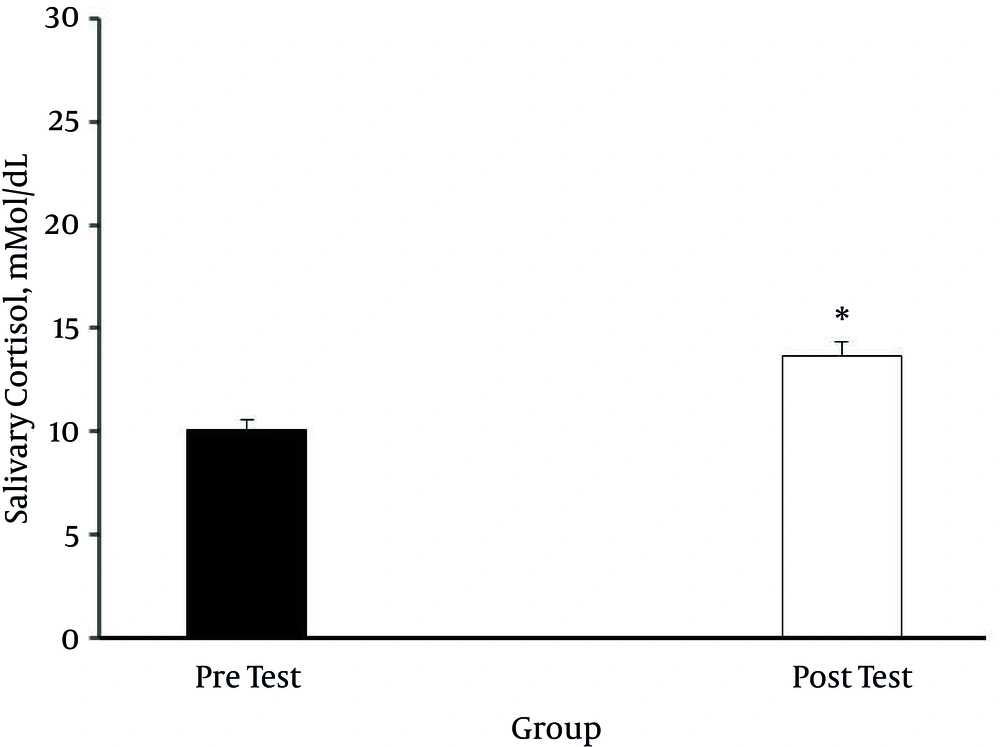1. Background
As the main factor distinguishing human-beings from other creatures, cognitive activities are particularly important in regulating people’s relationships together and with the environment. It seems that these activities can be influenced by the environmental changes. For instance, it has been shown that stress may be able to reduce cognitive activities such as the memory function (1). Stress is a state of threatened homeostasis that is counteracted by adaptive processes involving biochemical, physiological, affective, and cognitive behavioral responses in an attempt to recover homeostasis (2). It has been shown that stress may damage the hippocampus, which is involved in cognitive function, caused by neurochemicals or metabolic challenges (3-5). Moreover, cognitive ability such as judgment can be affected by environmental factors (6). Also, drug abuse as a stress factor could damage the central nervous system (7, 8). Various environmental factors can stimulate the synthesis and secretion of cortisol due to the activity of the hypothalamus-pituitary-adrenal (HPA) axis. Increase in cortisol level is considered as a main factor in reducing cognitive activity (9). These disturbances may affect the cognitive function temporarily or permanently (10). The prefrontal, temporal, parietal and occipital lobes and subcortical regions such as the hippocampus are the main area of the brain which is involved in cognitive functions (10). Stress affects in memory and cognitive functions in many ways (11). Moderate stress during learning can facilitate information storage, but excessive or severe stress chronically can be highly harmful to memory function (12). Stress can enhance a person’s susceptibility to false memories which is mediated through the impact of stress on the hippocampus and prefrontal cortex (12).
Diving with an independent breathing apparatus (SCUBA) has become a global sport. Effects of diving on cognitive functions have been previously demonstrated (13). Some of these studies have shown the neurologic effects of diving. Di Piero et al. (2002) (14) reported that cerebral perfusion abnormalities occurred under high pressure oxygen breathing in professional divers. Furthermore, Tetzlaff et al. (15) showed that elderly former professional divers were at risk of detrimental long-term effects on the central nervous system and decreased related neuropsychological performances.
The paced auditory serial addition test (PASAT), is one of the tests which is used for the evaluation of awareness processing tests by neuropsychologists. In this test the role of attention and short-term memory in which the stimulant is provided through vision or hearing is evaluated. This test also allows calculation of a temporal threshold measure that showed the speed of digital presentation that a person was capable of processing and providing the proper answer to. This test was first designed by Gronwall and Sampson (1974) (16) to measure cognitive efficacy in individuals with brain damage. Previous studies also show the full applicability of this test in patients with stress (17).
2. Objectives
The aim of the present study was to assess possible changes in cognitive function after a 20-minute diving session. To do so, a group of scuba divers with no history of decompression sickness was investigated using PASAT test. Since, in this study scuba diving may act as a stressor, which in long term can damage the intellectual capacity, through the application of PASAT test, changes in cognitive function such as general health, mental tiredness and attention are investigated in volunteers before and after diving. Moreover, the cortisol salivary concentration was considered in these volunteers as the most important stress hormone.
3. Methods
Twelve professional divers with a mean age of 23 ± 1, weight of 80 ± 2.5 kg and height of 1.79 ± 3.5 m resident in the city of Mashhad were recruited to participate in the test. Divers were non-smokers and volunteers taking any medications such as benzodiazepine or psychoactive drugs were excluded.
Their cognitive functions were measured 60 minutes before and 15 minutes after diving using the PASAT software. To determine their stress system’s activity, the subjects’ saliva samples were taken before and after diving for cortisol change evaluation. The PASAT software used in this study measures some cognitive functions, including general mental health, response speed, sustained attention and mental fatigue (17, 18). The PASAT software was used in the past to measure the degree of the effect of traumatic brain injuries on cognitive functions, but has recently also been used in the athletic community (17). In the present study, we have used the PASAT software to measure general health, mental fatigue, sustained attention and response speed in professional divers. The PASAT used in this study has been described in the previous studies (18). Briefly, in this test, 61 numbers between one and nine are randomly pronounced to the subject with 3-second intervals and the subject should add up each last two consecutive numbers and call out his answer before the next number is pronounced. For example, if numbers two and six are provided in this order, the correct answer to examine to announce would be eight. Each subject provides a number of correct answers in each test (response accuracy) and the test results are, therefore, compared before and after the intervention. The study also assessed the mean response time (response speed), the longest chain of correct answers (sustained attention) and the longest chain of incorrect answers (mental fatigue). Saliva samples were collected and conserved in 10 mm falcon tubes and were kept frozen at a temperature of -20°C. Measuring salivary cortisol was done by an ELISA kit (Cortisol ELISA kit, Diagnostics Biochem Canada Inc, dbc). On the day of the experiment, the samples were melted in the room temperature then, centrifuged for five minutes with a rotation of 3000 per minute, 20 micro liters of each sample was separated for the test (19, 20).
Data are expressed as Mean ± SEM. The Paired t-test was used to determine the significance of differences in the group. P < 0.05 were considered significant.
4. Results
4.1. The effect of 20 Minutes of Diving on General Mental Health (the Number of Correct Answers) as Assessed by the PASAT
The results showed that the number of correct answers significantly reduced after diving. This reduction was statistically significant (P < 0.05 and t9 = 2.493); (Figure 1).
4.2. The Effect of 20 Minutes of Diving on Response Time According to the PASAT
The results obtained from PASAT showed a significant increase in the response time after diving compared to before diving (P < 0.05 and t9 = 3.91); (Figure 2).
4.3. The Effect of 20 Minutes of Diving on Sustained Attention
As already discussed, the longest chain of correct answers is regarded as an indicator of sustained attention. The results showed a reduction in sustained attention after diving, which was statistically significant (P < 0.05 and t9 = 1.554); (Figure 3).
4.4. The Effect of 20 Minutes of Diving on Mental Fatigue
In the PASAT, the longest chain of incorrect answers is regarded as an indicator of mental fatigue. According to the results, a greater mental fatigue was observed in the subjects after diving, the increase was statistically significant (P > 0.05 and t9 = 2.493); (Figure 4).
4.5. The Effect of 20 Minutes of Diving on Salivary Cortisol Concentration
The cortisol concentration in the saliva samples collected was analyzed using the ELISA method. The results revealed a significant difference between salivary cortisol before and after diving. Diving has increased cortisol salivary concentration (P < 0.05 and t9 = 2.15); (Figure 5).
5. Discussion
The present study was conducted to assess cognitive changes occurring after 20 minutes of diving in professional divers. The changes in mental health, response time, sustained attention and mental fatigue were investigated to evaluate cognitive function. These factors were measured using the PASAT. Previous studies have used this test for patients with diseases such as multiple sclerosis, depression and injured nervous systems (21). The present study used this software to assess the effects of scuba diving as a stressor in cognitive function in a group of scuba diver volunteers. Also, a cortisol level change was investigated.
Analysis of the data showed a significant increase in response time after 20 minutes of diving (P < 0.05). Also, salivary cortisol level (the main stress system hormone secreted in the body) was increased after diving (P < 0.05). It has been shown that scuba can lead to reduced processing speed (22). On the contrary, running increased cognitive function in the male athletes (23). In this study, although response time is longer in divers, this parameter may be associated with a transient increase at the end of the diving and we suggest that changes in response time may be due to increased plasma cortisol levels. It seems that diving acts as a stress stimulant and increases cortisol levels, thereby reducing the cognitive function after diving. Increased cortisol levels can lead to a reduced cognitive function. Also, several studies showed that the administration of cortisol to healthy people can reduce their memory function (24-26). Moreover; the administration of corticosteroids such as hydrocortisone may also reduce the memory function (27). The reduction in memory function occurs in both humans and animals and is a major factor contributing to impaired judgment in individuals exposed to constant stress (28-31).
As already discussed, the number of correct answers was taken to indicate the individual’s mental health in the present study, which fell in the normal range in the divers. General mental health is an important indicator of proper mental performance and of the existence of a proper relationship between the various parts of the nervous system and cognitive functions, including memory, learning and fluent speech. Our data showed a brief descending trend in the divers’ mental health following diving. These changes can be regarded as indicators of rising cortisol levels due to diving. Also, it can be said that the learning capacity of individuals and preserving their mental health were not totally without an effect, and since all participants were professional divers, they were able to maintain a good level of mental ability. Other aspects assessed by the PASAT include mental fatigue and sustained attention. The analysis of the data showed that the mental fatigue increased and sustained attention decreased after dividing. Previous studies have shown that diving reduces sustained attention (22). The “autonomous phase” may be responsible for these slight changes; according to Fitts and Posner’s theory (1967) (32), the autonomous phase takes over at higher levels of learning. Individuals ascend to this phase after having undergone excessive training and then learn to increase their skill under different circumstances.
In conclusion, since the cognitive function is changed with variable factors, in this study the effects of diving were evaluated. It seems that a scuba dive may decrease brain cognitive function for a short time after diving. Based on our data, it can be concluded that after the diving response rate is low and it’s better that divers immediately refrain from doing something with high attention after diving.
